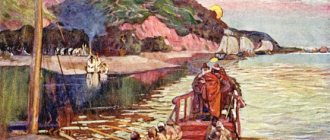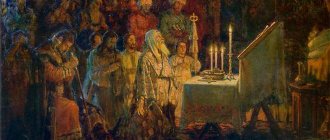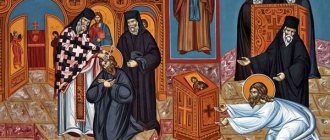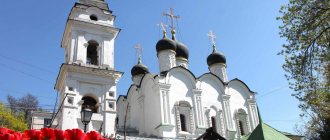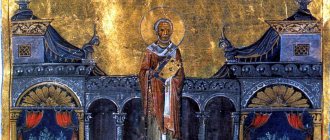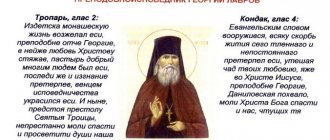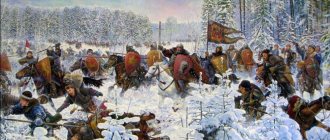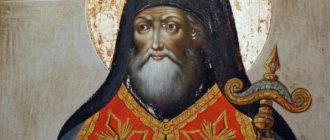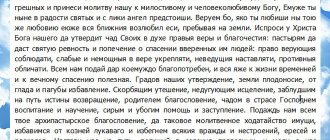Facts of prayer assistance according to the Bulgarian agreement
Prayer according to the agreement of Rev.
Vladimir Bolgar, with the blessing of the ruling bishop, has been held in the St. Abraham's Cathedral since 2004. During this period, many miraculous acts of prayer have occurred. So, eight-year-old goddaughter Anastasia Ostrovskaya from Moscow began to grow lumps like growths on the outside of her foot, doctors said that they needed to be removed and the child would have to spend six months in a supine position. Anastasia began to pray for the girl, and soon, to the surprise of everyone, one of the bumps resolved, and the other became much smaller;
For 12 years, Elena Romanova from Saratov had to do an unsociable job, she had to endure a lot, and constant worries affected her health, but there was no other choice. Starting in March 2022, on Thursdays, Elena began to say prayers to St. Nicholas the Wonderworker, and already in May she was offered another job.
And these are just some cases of miraculous help. In fact, there were a lot of them. Here is the text of the prayer according to the agreement of the Lord:
Lord Jesus Christ, Son of God, Thou hast declared with Thy most pure lips: “Amen, I say to you, that if two of you take counsel on earth about every thing, and if you ask for it, you will have it from My Father who is in Heaven: where are the two? or three gathered in My name, I am I in the midst of them.” Thy words are immutable, O Lord, Thy mercy is unconditional and Thy love for mankind has no end. For this reason, we pray to Thee: grant to us, Thy servants (names), who have agreed to ask Thee (request), the fulfillment of our request. But not as we want, but as You want. Thy will be done forever. Amen.
Answers to popular questions
Yes, you can. After all, you cannot remain indifferent to someone who is dying before your eyes. Love simply forces you to pray in this case.
It happens that people do not find understanding in their own home. It happens that husbands are aggressively opposed to any manifestation of the Christian faith. The priest advised one such woman to turn on the water and pray in the bathroom, secretly from her husband. Now the whole family, including children and grandchildren, comes to the temple. The Lord will not leave if a person asks for what he wants.
Is it possible for the unbaptized to participate in prayer by agreement?
The Lord of Christians is the God of mercy and love, He acts wherever He pleases. You cannot push away a person who comes with a desire to pray. Perhaps there is a great path ahead of him, what will happen if someone does not allow him to take the first step? There is an example in the Holy Scriptures when Peter was preaching in a house of the pagans, and suddenly the Holy Spirit descended on everyone. Perhaps now is the time when it is time to once again proclaim the Gospel to all the ends of the earth.
Is it possible to pray for a drunkard, because the Gospel says that they will not inherit the kingdom of God?
For God, everything is possible - Christ appeared precisely to save sinners. This passage of Scripture means that a person should not die while intoxicated, or spend his whole life in this terrible sin. If a person struggles, God will see it.
Is it possible to pray for something that God has not given? What if this is against His will?
Not every believer asks himself this question. Most often, a person wants what seems right and important to him.
Why doesn’t the Lord give what is so desired? There are usually two reasons - either the person is not worthy of it, or he is being saved for a more important matter. If you really want it, you can pray, of course.
But it’s still worth thinking: wouldn’t it be better the way God intended?
- Prayer according to the agreement of Andrei Tkachev
- Prayer of the Mother of God “Softening Evil Hearts” - find here
- Prayer to the Ostrobramskaya Icon of the Mother of God.
How did this man die?
Continuing to engage in trade affairs after receiving holy baptism, Abraham of Bulgaria, of course, visited home several times, and was not only on the road. Of course, like any wealthy person, he owned land and was the owner of the estate.
Much more is known about the death of the future saint than about his life. And the point is not at all that Abraham accepted a martyr’s death. Witnesses to his death and everything that preceded it were merchants from Murom. It was the Murom people who bought the body of the future saint and buried him according to Christian custom.
The future saint of the Great Bulgars died. In those days, this city was the capital, and large trade fairs - “aga-bazaars” - were held there. Traders from all over came there, presenting their goods and engaging, as they would say now, in concluding deals.
Of course, the future saint, who actively preached the ideas of Christianity and was engaged in missionary work, could not miss the opportunity to talk about the Lord, because the bazaar gathered a large number of different people. Moreover, Abraham did not believe that there was anything to be afraid of, because he was on his native land.
Speaking to a crowd of people with a sermon, the future saint Abraham of Bulgaria faced not only misunderstanding on the part of his compatriots, but also rejection, as well as outright aggression. From time immemorial, people have tried to change the worldview of their neighbors, which did not correspond to their own views, feelings or beliefs. The future saint became a victim of this type of behavior.
At first, of course, he was persuaded. Of course, the purpose of the persuasion was to renounce the Lord, to return to the religion within which Abraham grew up and was raised. But, faced with the firmness of his faith, and quite possibly with a new, more private sermon, people began to threaten him. These threats, according to the testimony of Murom traders, did not relate to the health and life of the future saint. They promised to confiscate his property, take away his land and house.
The threats had no effect; moreover, the future martyr Abraham of Bulgaria, probably in the heat of feelings, recklessly declared that he would not regret not only his property, but also his own life for his faith in the Lord. Most likely, such a statement became a kind of catalyst, an impetus for the splashing out of aggression. They started beating the saint. They beat him so much that not a single part of his body was left without damage, even all the bones were broken.
Despite such serious injuries, life remained in the saint’s body. Then the tormentors, starting to beat their fellow countryman, threw him, bleeding, into the prison dungeon. But even when he found himself on the verge of death, suffering unbearably physically, Abraham did not renounce the Lord. In those moments when the future saint was conscious, he glorified the name of Christ and exhorted the guards to accept the true faith, preaching to them.
Of course, such steadfastness did not evoke understanding among the tormentors. On the first day of April, Abraham was taken out of town, to an old well, and executed. The execution was also not easy. The martyr's limbs were gradually cut off - they started with the hands, then it was the turn of the forearms. Thus, he was deprived of his arms and then his legs. But even drowning in his own blood, Abraham glorified the name of the Lord and begged him to forgive the executioners. Tired of the bullying, the tormentors cut off the future saint's head.
The martyr was buried by Murom merchants, who witnessed both the unsuccessful sermon in the market square and the painful execution. Abraham was buried in a special graveyard for local Christians, and soon miracles began to happen near his grave, rumors about which quickly spread not only throughout Bulgaria, but also throughout the Russian principalities.
Song 1
Irmos:
Ancient Israel walked across the dark abyss with damp feet and defeated the power of Amalek in the desert with the cross-shaped hands of Moses.
Chorus:
Holy Martyr Abraham, pray to God for us.
Innumerable in mercy, O Christ the Savior of the world, give us understanding, unworthy to celebrate the memory of Thy sufferer. You, most passion-bearing one, give us a pure mind to despise all the things of this life and seek the only need for salvation.
The Eternal God has given you the power to crush the enemy’s heaps and endure all torments, but you, sinners, grant us a mind of praise to bring you and pray for everyone who praises you.
Glory to the Father, and the Son, and the Holy Spirit.
God-wise, passion-bearing Abraham of Christ, do not disdain us, defiled by our sins, and do not reject this little praise from us to you, but accept it and for all who sing your praises, pray to the Lord, and let us rejoice in all your memory.
And now and forever, and forever and ever. Amen.
Theotokos:
Show Thy mercy, O Most Pure Lady, to us who are unworthy, as we come running to You with heartfelt tears and a cry: have mercy on us, the only salvation for all sinners.
Veneration in Bulgar (Bolgar)
Abraham of Bulgaria was especially revered and is also revered in the village (now the city) of Bolgars, located on the site of ancient Bulgar.
After the conquest of the Kazan Khanate, not far from the place of suffering of the martyr Abraham of Bulgaria, a temple was erected, where part of his holy relics (right hand) rested. At the very site of the saint’s martyrdom, above the healing spring, a well was built, and next to it a monument-chapel in the form of a tetrahedral pillar, on the sides of which icons were placed.
In 1878, Bishop Theognost (Lebedev) of Vladimir sent an icon of the holy martyr with a particle of his relics to Bolgar. In 1892, the Holy Governing Synod allowed, at the request of the village residents, to move from Vladimir the wooden shrine in which the saint’s relics were located until 1806, and place it in the Assumption Church of the Bolgars in the chapel in the name of Abraham of Bulgaria. The ceremonial transfer, with a religious procession, took place on May 30, 1892; the icon of the martyr sent from Vladimir was placed on the shrine.
During Soviet times, the shrines were lost, the chapel at the well at the site of the martyr’s death was destroyed, and the well itself was desecrated. Only the phalanx of the finger of the right hand has been preserved, preserved by the residents of the city in their homes, which is now located in the Temple of the Holy Martyr Abraham of Bulgaria (St. Abraham's Church) in the city of Bolgar.
In the fall of 1993, the chapel was rebuilt and consecrated, along with it the well, which had previously been cleared of sewage and debris, was consecrated. At the same time, two springs of clean water were discovered at its bottom.
It is believed that the martyr Abraham of Bulgaria has a special grace-filled power to intercede before God for sick children (records of the healing of the sick have been preserved). Abraham of Bulgaria is prayed for patronage and success in trade and personal entrepreneurship.
When does the church remember a saint?
The Akathist to Abraham of Bulgaria is served on the day of his death, that is, the first of April. The readings mention his short life and talk about martyrdom and feat in the name of the Lord.
Particular attention is paid to this saint in the churches of Vladimir, Kazan and the town of Bolgar, which only ceased to be a village in the 90s of the last century. It is located on the site of the ancient Volga capital, in which the saint received his martyrdom
We advise you to study the Albazin Icon of the Mother of God
It is also believed that the ancient city of the Bulgars is not only the place of Abraham’s death, but also his native land.
In addition to the fact that the akathist to Abraham of Bulgaria is read on the first day of April, the saint is honored throughout the following week in the churches of Kazan, Vladimir and Bolgar.
